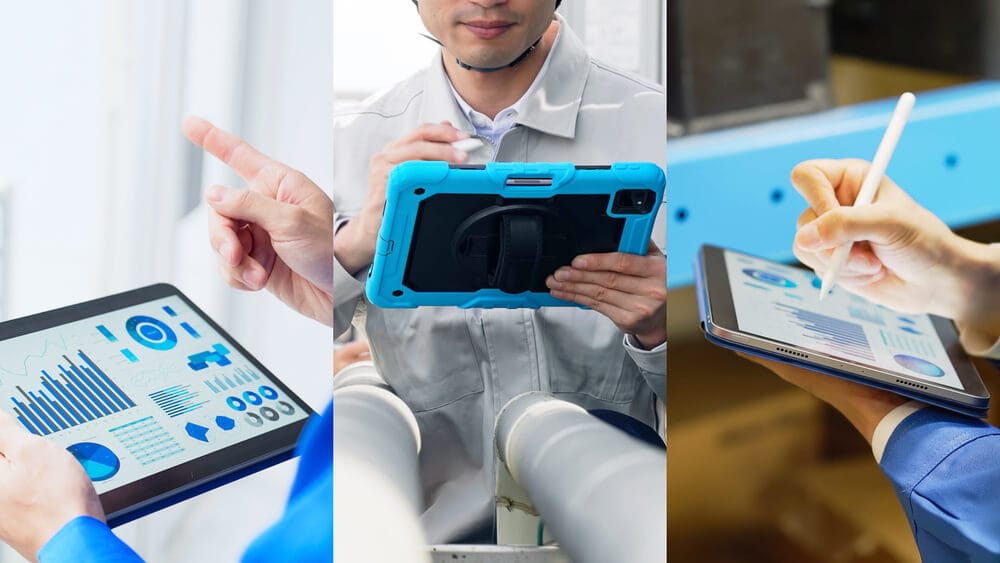Real-Time Data: The Competitive Edge Businesses Need
Imagine knowing about a machine failure before it happens or adjusting supply chains in real time to avoid delays. That’s the power of IoT data processing—it transforms businesses from reactive to proactive. Companies leveraging real-time data respond 50% faster than those relying on outdated reports.
Why does this matter? Every second counts in business. Whether monitoring production lines, managing inventory, or tracking logistics, instant insights = better efficiency and fewer disruptions.
How IoT enables real-time decisions:
- Sensors detect issues before they escalate, preventing downtime.
- Automated alerts allow immediate adjustments to workflows.
- Live tracking optimises supply chains, reducing costs and delays.
For instance, manufacturers using IoT sensors identify machine faults early, preventing expensive breakdowns. Logistics companies track shipments in real time, optimising routes to lower fuel costs and speed up deliveries. Without these capabilities, businesses operate on guesswork, leading to inefficiencies.
IoT-WorkS helps businesses leverage real-time monitoring to enhance operational efficiency, reduce downtime, and improve decision-making.
Managing Large Amounts of IoT Data
The sheer volume of IoT-generated data can overwhelm businesses. Without a clear strategy, valuable insights can get lost in the noise. The key is filtering what matters and acting on it quickly.
Smart IoT data management = better insights and lower costs.
Companies that master data handling turn overwhelming information into actionable strategies. Here’s how:
- Cloud storage scales with business needs, ensuring secure, real-time access.
- Edge computing processes data closer to the source, reducing lag and network congestion.
- AI-driven analysis highlights key trends, removing irrelevant noise.
Retailers, for example, use IoT to track customer behaviour and stock levels. They drown in unnecessary data without proper filtering, missing key purchasing trends. Manufacturers monitoring production lines face the same challenge—valuable operational insights go unnoticed without structured storage.
So, how do businesses make sense of it all? They turn raw data into action—how IoT analytics boosts efficiency.
IoT Analytics for Operational Efficiency
Every business wants faster, leaner operations. But without data-backed decisions, inefficiencies go unchecked. That’s where IoT analytics makes the difference: It identifies problems before they become costly mistakes.
Data-driven adjustments = less waste more profit.
How do IoT analytics improve operations?
- Predictive maintenance—sensors flag potential failures before machines break.
- Supply chain optimisation—real-time tracking reduces delays and improves delivery routes.
- Energy efficiency—IoT systems adjust power usage to cut costs.
Consider logistics companies analysing vehicle routes to cut fuel waste, factories using IoT sensors to prevent breakdowns, or office buildings automating climate control for energy efficiency. Businesses that use IoT analytics gain a competitive advantage by reducing waste and improving productivity.
IoT-WorkS empowers businesses with IoT-driven analytics, providing tailored solutions to improve efficiency across industries.
IoT for a Better Customer Experience
Customers expect fast, seamless service. IoT delivers by personalising interactions and streamlining processes, leading to higher satisfaction and loyalty.
- Personalised shopping—IoT analyses habits to suggest tailored recommendations.
- Faster service—Smart automation reduces wait times and improves responsiveness.
- Greater convenience—Connected devices let customers control settings in stores, hotels, and homes.
Retailers track store traffic to design better layouts, while hotels simplify check-ins with smartphone-based keyless entry. In healthcare, wearable IoT devices allow real-time patient monitoring, improving treatment outcomes.
By combining real-time insights with customer needs, businesses create smoother, more engaging experiences. But none of this works without strong security measures—let’s explore how IoT helps protect businesses.
Security and Risk Management with IoT
Security threats evolve quickly, and businesses cannot afford to lag. IoT-based security systems offer 24/7 monitoring and automated risk detection, ensuring the safety of assets, data, and operations.
Stronger security = fewer breaches and lower risks.
How does IoT enhance security?
- Smart surveillance—IoT cameras detect unusual activity instantly.
- Access control—Connected locks restrict entry to authorised personnel.
- Cybersecurity monitoring—AI-driven systems identify and block threats before damage occurs.
Warehouses use IoT-powered surveillance to prevent theft, offices implement automated access controls, and businesses rely on IoT-enabled cybersecurity for real-time protection.
IoT-WorkS provides complete security solutions, ensuring businesses can operate confidently without cyber risks or physical threats.
Smarter Business Decisions with IoT
Imagine making every business decision based on real-time, accurate data. That’s the power of IoT-driven decision-making—it eliminates guesswork, improves efficiency, and boosts profitability.
Real-time insights = smarter, faster decisions.
How does IoT refine decision-making?
- Optimised inventory management—Prevents stockouts and overstocking.
- Workforce planning—Monitors productivity and automates scheduling.
- Market trend analysis—Tracks consumer behaviour to forecast demand.
Retailers adjust stock levels instantly, manufacturers predict equipment failures, and businesses optimise marketing strategies based on live trends. The result? Lower costs, higher productivity, and a strong competitive edge.
IoT-WorkS helps businesses implement intelligent IoT solutions, ensuring smarter, faster decision-making across industries.
Conclusion
The Internet of Things (IoT) is changing how businesses work. Companies use IoT for real-time monitoring and advanced analytics. This helps them improve processes, enhance security, and provide better customer experiences.
By using IoT to make decisions, businesses can rely on real-time data to guide their choices. Good data management with IoT prevents information overload and ensures companies get value from their data. IoT data processing helps keep operations running smoothly, and insights from IoT help businesses stay competitive.
